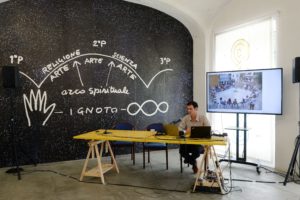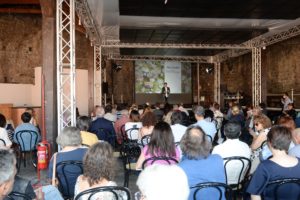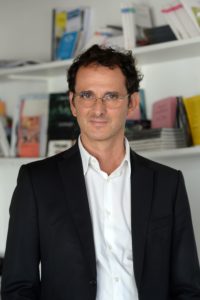A middle-aged lady, book in hand, curiously observing her own reflection in a mirror. A councillor in a suit impulsively checking his smartphone. A premiership footballer, captain of his team, who discovers with amazement the relationship between art and football while scrutinising a work of art. A student with an extravagant backpack on her shoulders, conversing under her breath with a fellow student. A farmer with calluses in his hands and the tired eyes of someone who has been working since dawn. A young fashion designer covering himself from the cold by wearing sustainable clothes. A busy journalist with a camera crew in tow. Five international artists-in-residence getting to know each other over a cup of coffee. A group of lively children who, together, already want to change the world.
These are not the suspects or witnesses at the centre of an investigation in a mystery novel. Nor are they a flight of fancy. But if there is no ambiguity, what do these people have in common? What do they share? So, point-blank, there are few doubts: by their age, profession and geographical origin they have no apparent connection. Yet, these distant worlds periodically converge at a cultural crossroads. The dynamics and moments presented are in fact just a few fragments of everyday life that have a common background. The reference is to a former wool factory, a complex of industrial archaeology protected by the Ministry of Culture located at the foot of the Biellese Alps: Cittadellarte. Yes, because in the folds of time of this artistic organisation, the figures mentioned are some of the extras or protagonists of a production by Fondazione Pistoletto in continuous writing and evolution.
Indeed, every day, an extended community of thinkers, administrators, innovators from every sector of the social fabric lives around it, shaping a perpetual process in which cultural identity is linked and nods at socially engaged art. In this framework, a primary role is played not only by Michelangelo Pistoletto, but also by the so-called cittadini, Cittadellarte citizens – employees and collaborators of the Foundation informally call themselves so, editor’s note – and, using a political analogy, its first citizen, the director of Cittadellarte. To tell the truth, he does not feel this definition to be appropriate, not even in jest: when I ironically defined him in this way, he immediately distanced himself, defining himself as “primus inter pares”. We met with him to bring order to the marvellous and complex heterogeneity that characterises the organiation he directs, looking at the year that is about to come to an end. Paolo Naldini opened up touching on topical issues and offering transversal reflections on the Foundation’s past, present and future.

Paolo, let’s begin with your 2023 review of Fondazione Pistoletto. What, in your opinion, were the most significant events of the year?
Through a demopratic work, the canton of Geneva changed its constitution to include the right to food, thanks to the initiative of Rebirth/Third Paradise ambassador Walter El Nagar and the MATER Foundation.
I would also mention the ‘Fashion to Reconnect‘ exhibition, in partnership with the Italian National Chamber of Fashion, which tells us how we can reconnect with nature through clothing; I would also highlight the related events of the Parliament for the Rights of Nature proposed as part of Milan Fashion Week.
And then COP28, where we brought the experience of our Academy of sustainable fashion and art for responsible social transformation: we will never be able to change the world if we don’t change our way of thinking first.
From the Russian-Ukrainian crisis to the Israeli-Palestinian armed, political and social conflict: preventive peace continues to prove to be a pressing and topical concept. What can be the impact of art in a context of war?
I am not afraid of conflict, because tension can generate the energy for a positive change for everyone. It is our ability to remove the evidence before our eyes and to subject ourselves to deadly and destructive narratives that frightens me, as well as to erase the humanity of the other, to make them pure instrument of our own blind self-interest, all this while portraying ourselves as bearers of truth and virtue, if not even encouraged by our god. If art helps us make our thinking autonomous and responsible, is it not precisely during the horror of war that this can make a difference? It is certainly true for Ḥamās terrorists and Netanyahu, but above all it is true for all of us, because it is on the consent of all of us that all the leaders of death base their power.
Let’s move on to another of the dramas of our time: feminicide. In Italy, there were more than 100 victims in 2023. How can we raise social awareness to fight gender violence? Can art have a function in this process?
The formula of creation starts by recognising a tension between two subjects and arrives at an outcome quite different from the mercilessness of feminicide, i.e. the elimination of the other. It arrives at a third condition that unites but maintains the two pre-existing subjects. The circle of this connection can also be created by considering the two conflicting individuals able to find an agreement to separate peacefully and exist in the world no longer together. Human intelligence can well create this third space between us and another person while respecting their integrity and dignity. This creative faculty is rooted in the same dimension in which art is born.

This year too, you have been invited to speak at international conferences (for example, your participation at the UN General Assembly in New York) and everywhere in our country. The most recent occasion of global authority was the COP28 in Dubai mentioned above, where you spoke at the talk Climate Change is not Cool: a sustainability message from the fashion world in the Sustainability Education for Fashion panel. This edition of the global climate summit generated controversy since the UAE are among the world’s leading exporters of oil and natural gas. Besides the criticality of fossil fuels, is the Conference of the Parties a potpourri of sterile proclamations, or are such occasions of media resonance an essential step to work concretely to comply with the Paris Agreement?
The fact that the oil-producing countries are involved in the climate COP is very good news. The fact that the final text approved declares the abandonment (transitioning away) of fossil fuels in our energy systems is very good news. The fact that thousands of delegates gathered to talk about the climate crisis is very good news. The fact that this leaves the activists and defenders of our planet as well as us satisfied is very good news.
We propose a parallelism involving our Food Office. In line with Let Eat Bi, what would be the essential ingredients if you were to cook a metaphorical dish called ‘sustainability’?
Plant-based food.
Cittadellarte is articulated through a network of offices that relate art to every sector of the social fabric, also in reference to the manifesto Progetto Arte. With this in mind, can you identify keywords for the offices and projects that shape the macrocosm of the Foundation?
This question should be put to the artivators of Cittadellarte. They are the people in charge of the Fondazione’s Uffizi who develop their projects through art and their professionalism. I, however, can share my keyword: co-creation.

The winter holidays are about to begin. Apart from the religious aspect, they allow people to share time with their closest social sphere. What significance does an occasion like this hold for you?
For almost 20 years, Christmas in my very large family – I am the fourth of five children – has had its most intense moment in the ‘ritual’: each time different, it is always a moment in which we share contributions that we have collected throughout the year in relation to a song, a book, a memory, a thought or a particularly significant event that is shared publicly through a guessing game. It is a convivial ritual by which we listen to each other and (re)get to know each other from year to year. The children become teenagers and the adults less and less young. I proposed it to my family members in order to find together a spirituality founded on ourselves rather than received, pre-constituted by others. For all of us, it is now the highlight of that precious time that Christmas gives us.
Let’s conclude by venturing into an introspective dimension. What’s nourished Paolo Naldini’s happiness in 2023? What will be the sap to nourish it in 2024?
My happiness has been muted by the despair and horror that the Palestinians are experiencing as victims of a new holocaust, the tragedies that oppress the Ukrainians, the Syrians, the sub-Saharan and Libyan peoples, and millions of children, women and men who are defenceless and innocent, like the young Israelis massacred during the 7 October rave. Unfortunately, hardly any political leader is of any worth, most of them are crushed by their smallness and incapacity. They only know how to wage war, sow hatred, and provide business for the military and security industries. We need civic communities capable of producing representatives of value, of uniting the forces of peace at all levels of the social fabric, of learning to do without the leaders of hatred and subservience, of raising their heads, of uniting their arms to embrace the planet and all its inhabitants.

